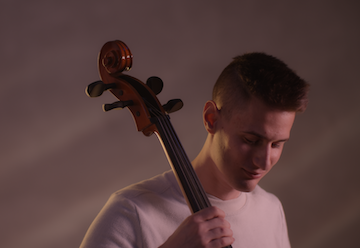Seaver College Alumnus and Composer Jeremy Zerbe (’21) Scores Pepperdine Production of the Tempest

Jeremy Zerbe has a unique neurological condition of the brain called synesthesia, which causes the 24-year-old composer to translate noise into visual colors and textures.
“When I hear sounds, I interpret them visually,” he says. “I didn’t know that that wasn’t a universal experience until later in my life. This realization solidified my thinking that I have something unique to say with music.”

Thus far, the Seaver College graduate has composed scores for five different theatrical productions at various Los Angeles playhouses. His latest musical endeavor, however, will be enjoyed in Malibu, as he writes and helps perform the orchestral arrangements for Pepperdine’s The Tempest, premiering on Wednesday, April 3, 2024, at Smothers Theatre.
“It is very special to come back and compose for Pepperdine,” Zerbe says. “My senior year was during the pandemic. Now I get the chance to be a part of campus again, witness how the theatre department has grown, and enjoy all the facets of this community that I missed in my last year as a student. It’s a beautiful time.”
Zerbe’s musical career launched at Pepperdine. Hollace Starr, an associate professor of theatre at Seaver College, originally asked the young musician to compose the score for As You Like It—Pepperdine’s 2021 remotely performed production. This unorthodox introduction to theatre proved fruitful to Zerbe, whose senior-year efforts earned him the opportunity to write this year’s in-person production.
The composition process, Zerbe explains, is a multifaceted endeavor. A composer must be equal parts reader, historian, and musician. The music starts with the script, as Zerbe pores over the text, learning the rhythms and themes of the narrative. From there he dives into the history of the work, paying close attention to the instruments that were popular when the play was originally produced. And, finally, he puts pen to paper and begins drafting pieces.
“For a stage production, especially a Shakespeare play, you’re interacting with a historical text that’s been retold many times,” Zerbe says. “That’s always a joy, but you have to know the history and style that informed the original staging decisions, because the way art, particularly music, was made back then is very different from the way it’s made now.”
The Tempest demands a significant body of music throughout its story. Zerbe composed a total of 24 different musical numbers that support the play with melody and harmony as it moves forward. Once the music is written, the composer teaches it to the orchestra and helps synchronize the stage action with the scores.
“Not only is Jeremy a brilliant composer, but he's an incredible collaborator,” says Cathy Thomas Grant, the director of The Tempest. “He is so patient. He has, on two occasions, stayed in the theater until 2AM fixing the music and surround sound. He's so dedicated and so thorough. I can't speak more highly of any composer I've ever worked with.”
Creating art takes time, and Zerbe has been happy to contribute his. He admitted that he often worked late into the night to perfect The Tempest’s musical arrangements, but the activity was a labor of love.
“I love music,” he says. “While I was at Pepperdine as a student, I knew I wanted to compose for the media and orchestras. I wanted to work with the best players I could find and make music that is interesting and intellectual.”
Pepperdine offered Zerbe a chance to flex this creative muscle throughout his time as an undergraduate. He composed music for podcasts and stage productions and performed in the orchestra and chamber choir. These experiences propelled him into his profession, where Zerbe’s passion and talent have served as the foundation of a flourishing career.
For Zerbe, music is a vocation—a God-given calling to work with rhythm and harmony. He discovered this passion growing up, nurtured it at Seaver College, and now shares this compositional aptitude as his life’s work. On April 3, another production will be added to his growing resume.
“I’ve always liked to follow the music and take the creative course of action,” says Zerbe. “It’s a playful medium. Music exists only so long as you keep playing it.”